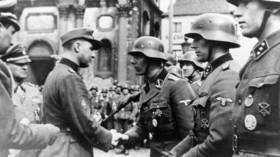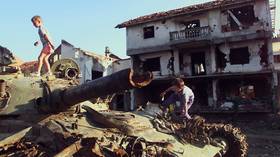The crocodiles are hungry: Fascism back in Eastern Europe, appeased by the West
The appeasement of fascism in the 1930s is justly considered the nadir of Western liberal democracy. Its appeasement today is thus inexcusable.
Someone much cleverer than I once argued that history repeats itself, first as tragedy, second as farce. The fact that we are currently living through a recrudescence of fascism in Eastern Europe, in states allied to the West, is more than a tragedy and certainly no farce.
In Estonia, Latvia, Lithuania, Western Ukraine and Poland the celebration and embrace of fascist ideas, iconography, history and ideology is back with a sinister vengeance. It’s almost as if the most devastating and barbarous period in Europe’s long and tortured history, the 1930s and 40s, never took place. It’s as if the vast killing fields of WWII in which millions perished – its mass graves, executions, and the Nazi death camps in which the systematic genocide of the Jews was attempted on an industrial scale – were a figment.
For there is no other possible explanation for the insouciance with which the West has ignored the monster of fascism that’s been hatched in Eastern Europe of late, instead consumed with anti-Russia animus to such a degree that fascism is either deemed of no small importance or a price worth paying.
When you understand that this very dynamic allowed for the rise and growth of fascism in Europe in the 1930s, involving Western ruling classes actively courting fascism as a counterweight to the rising tide of communism and communist ideas among their own workers in the context of a global economic depression, and that in the eyes of Western ruling classes today Russia and the Soviet Union are one and the same, clarity is achieved.
Because just as back then the Soviet Union was accorded the role of evil ‘other’ in the West, so Russia has been assigned the same role today. Regardless of the fact that you can fly to Moscow from London, Washington or Paris today and you could spend the day shopping for the same clothes in the same chain stores and eating the same food in the same eateries you left behind. In other words, Russia is as capitalist today as ‘we’ are, meaning that the ideological threat of communism is a footnote.
And yet, despite this, the maintenance of Moscow as an existential threat is promoted in the West as passionately and with as much gusto as it was when the hammer and sickle was flying proudly over the Kremlin.
Why?
Well, here’s where things get funky. The function, the objective to this exercise in elevating a non-threat to an existential threat, is to frighten the kids, i.e. people living in the West, in order to bind them to their parents for protection, i.e. the very ruling classes they need protection from. They call it the national interest, you see, when in fact it is ‘their’ interest being presented as the national interest.
READ MORE: Ukrainian city topples Soviet WWII monument ‘in critical condition’… after 3rd attempt (VIDEO)
Returning to the topic, this imaginary threat from the imaginary enemy that is Russia is being propagated to the point of exhaustion in the West. Annual commemorations paying tribute to Estonians, Latvians and Lithuanians who served in Waffen SS detachments established in each of those states during WWII are now a regular fixture, taking place with the imprimatur of government support and endorsement.
Here’s Michael Goldfarb, writing in Salon: “The official tolerance for marches honoring those who fought with the SS is part of a general trend in the Baltic States and all along the eastern borders of Europe: an embrace of a form of exclusionary nationalism that belongs to the 19th century, rather than the globalized 21st. It is the kind of nationalism that underpinned Hitler’s theory of “One People and One Reich.”
In Western Ukraine, meanwhile, five years on from the violent coup in Kiev that succeeded in toppling the country’s elected government, fascism comes dressed in the uniform of the coup regime’s National Guard regiment the Azov Battalion, replete with the closest thing to an SS insignia badge you will find short of an actual SS insignia badge.
In 2018, US author and journalist Max Blumenthal revealed that four white supremacists, under indictment by the FBI, had travelled to Ukraine to train with the Azov Battalion, writing, “After a wave of racist violence across America that culminated in the massacre of [11] Jewish worshippers at a Pittsburgh synagogue, the revelation that violent white supremacists have been traveling abroad for training and ideological indoctrination with a well-armed neo-Nazi militia should cause extreme alarm.”
Also on rt.com Ukraine’s neo-Nazis ‘believed’ to have trained US white supremacists – FBIAccompanying this renaissance of fascism and Nazi ideology in Eastern Europe has been a growing trend of historical revisionism when it comes to WWII. Under its noxious terms we are invited to believe that no intrinsic difference existed between the Soviet Union and Nazi Germany, no matter the indispensable part played by the former in defeating the latter’s genocidal project as part of the Grand Alliance with Britain and the United States.
This revisionist history was never more in evidence than during the 2017 centenary of the Russian Revolution, catalyst for a production line of books, documentaries and articles, pumped out with the objective of demonising the event, the state it gave birth to, all with an eye on drawing association between the Soviet Union then and Russia today.
How else to justify the new Cold War and the ever burgeoning network of neoconservative and liberal interventionist think tanks and foundations whose very existence depends on it? And how else to justify a ginormous US military budget and NATO’s continued existence thirty years after the fall of the Berlin Wall?
For an example of the offerings being served up in the guise of serious historical analysis under the rubric of this 21st century school of revisionism, consider this snippet from a Simon Sebag Montefiore piece in the New York Times to mark the centenary of the Russian Revolution:
Without Lenin there would have been no Hitler. Hitler owed much of his rise to the support of conservative elites who feared a Bolshevik revolution on German soil and who believed that he alone could defeat Marxism. And the rest of his radical program was likewise justified by the threat of Leninist revolution. His anti-Semitism, his anti-Slavic plan for Lebensraum and above all the invasion of the Soviet Union in 1941 were supported by the elites and the people because of the fear of what the Nazis called “Judeo-Bolshevism.”
So, here we have Lenin and the Russian Revolution being blamed for Hitler and the rise of fascism almost two decades later.
Also on rt.com Siding with fascism: Western ideologues pose greater threat to the West's security than ISISAbstracted in service to this historical distortion is, of course, the central role of WWI – in which millions of young men were hurled into a crucible of death at the behest of sclerotic autocratic states and colonial empires – in creating the conditions of societal and economic breakdown out of which Lenin and the Bolsheviks rose. And also abstracted is the fact, the undeniable fact, that Hitler was not a product of Lenin but of the Treaty of Versailles, forced on Germany at war’s end in a classic example of a Carthaginian peace.
No, the inconvenient and condemnatory truth is that the midwife of fascism in the third decade of the 20th century, Western hegemony and the free market economic system that sustained it, is again its midwife in the second decade of the 21st.
“An appeaser is someone,” Churchill memorably opined, “who feeds a crocodile hoping it will eat him last.”
Across Eastern Europe the crocodiles are hungry.
Think your friends would be interested? Share this story!
The statements, views and opinions expressed in this column are solely those of the author and do not necessarily represent those of RT.
















